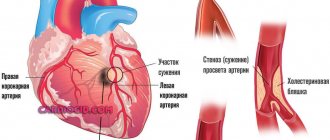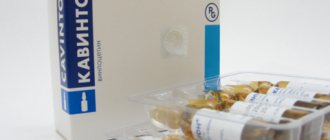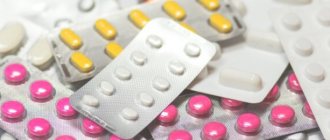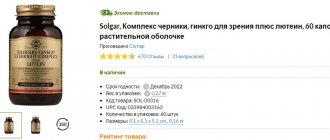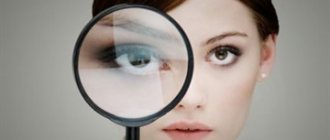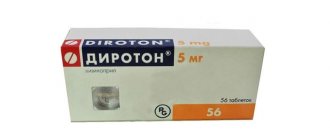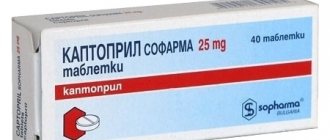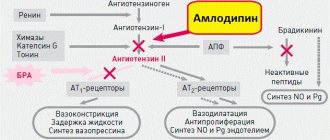Hypotension is not such a common disease, but it can also be dangerous for the patient. Low blood velocity through the vessels, due to the fact that a reduced pressure indicator occurs, leads to hypoxia of all tissues. First of all, the brain, kidneys and heart muscles are affected. As a result, serious diseases develop, including myocardial infarction and endarteritis (inflammation of peripheral vessels). Therefore, it is important to understand what to take for low blood pressure, but first you should learn to identify hypotension and low blood pressure in yourself.
Hypotension is common and requires serious treatment.
Drugs that increase blood pressure
Low blood pressure (BP) can be the limit of normal if a person feels normal with low blood pressure, or a pathology when life-threatening conditions develop.
Arterial hypertension (hypotension) is as common as hypertension, but not every person pays attention to it. Symptoms of low blood pressure are:
- dizziness;
- weakness (especially in the first half of the day);
- nausea;
- loss of performance;
- lack of appetite;
- frequent fainting.
Modern people, due to constant stress, lack of sleep, fast pace of life, may suffer from low blood pressure
Yachnaya Alina, oncologist surgeon, higher medical education with a degree in General Medicine.
From this article you will learn:
- What pills can you use to increase your blood pressure? There are not so many drugs prescribed for this purpose.
- Which medications increase blood pressure very effectively, and which are only suitable for relieving moderate hypotension? Author's rating of popular pills by effectiveness.
For low blood pressure, it is most convenient to use tablets as self-help medications. They do not act as quickly as injections, but you can use them yourself without waiting for a doctor or nurse.
They cannot significantly increase blood pressure in the event of sudden hypotension (against the background of shock, exacerbation of cardiovascular failure, blood loss), but in such situations qualified medical care is always necessary.
But it is quite possible to improve your well-being with a moderate decrease in pressure against the background of vegetative-vascular dystonia with the help of tablets.
Next is an overview of the list of 10 drugs.
Ephedrine
Ephedrine
Ephedrine is one of the most effective drugs in tablet form that can significantly increase blood pressure. An ephedrine tablet under the tongue will be a good help even in case of fainting caused by severe hypotension.
A significant drawback of this medicine is the difficulty of acquiring it, since ephedrine is dispensed strictly according to a doctor’s prescription. Doctors usually do not prescribe ephedrine for vegetative-vascular dystonia, choosing other drugs for a course of treatment.
If you still have the opportunity to purchase it, then use the tablets extremely carefully - inaccurate, incorrect dosing can lead to the rapid development of side effects - uncontrollable increase in blood pressure, nervous overexcitation, vomiting, insomnia.
Adrenalin
Adrenaline is another powerful remedy for eliminating hypotension. Just like ephedrine, it is sold strictly according to a doctor's prescription, and it is also difficult to find in tablet form.
The indication for the use of adrenaline is a significant decrease in blood pressure (upper 70 mm and below). Side effects are similar to those of ephedrine.
Regulton
Regulton is one of the few drugs with good effectiveness, but it is affordable (available in pharmacies).
It is prescribed for the treatment of a variety of manifestations of vegetative-vascular dystonia with hypotension, with orthostatic hypotension (when the pressure drops during the transition from a sitting or lying position to a standing position).
Regulton is widely used to treat chronic fatigue syndrome and decreased performance due to hypotension.
To a greater extent, this drug is suitable for planned treatment - in case of a constant tendency to arterial hypotension. It is prescribed over a long course, and the doctor individually selects the dose for each patient, stopping at the minimum effective (that is, the smallest dose of the drug at which the desired effect can be achieved).
The disadvantage of the drug is that it cannot be used in cases of acute hypotension, since the effect of the drug develops gradually, over an hour. But with a slight decrease in pressure (systolic within 80–90 mmHg), taking 1 tablet of Regulton is usually enough to normalize it.
Heptamil
Heptamil is a fairly effective non-toxic drug that is commercially available (by prescription).
In tablet form, it is suitable for both single use with a slight decrease in pressure, and for the treatment of persistent hypotension.
Fethanol
Fethanol is also available by prescription. In tablets, it increases blood pressure quite quickly and for a long time while reducing it moderately.
Gutron
Gutron is an effective drug used both in emergency cases (with a sudden drop in pressure, pre-fainting) and for the permanent treatment of low blood pressure.
Caffeine
Caffeine is a pill widely used to increase blood pressure. Although officially they must be dispensed with a prescription, in reality they are often sold freely in pharmacies. An affordable drug, both in terms of availability and free sale, and in terms of cost.
The effectiveness is average: a caffeine tablet will help eliminate or reduce the severity of symptoms of hypotension (headache, dizziness, weakness), but a significant increase in blood pressure cannot be expected from it.
Caffeine is not used for the permanent treatment of vegetative-vascular dystonia, since it gives many undesirable side effects (insomnia, nausea, headaches) and is inferior in comparison with regulton and heptamil.
Pantocrine and rantarine - these tablets belong to dietary supplements and are included in the group of general tonics. Moderately increase vascular tone and activate the nervous system. Suitable for the treatment of moderately severe low blood pressure or lethargy. They do not increase pressure sharply; in emergency cases, their use is ineffective.
Citramon (askofen) is available over-the-counter, low cost, and easily accessible. Refers to a combination drug, it contains several active ingredients - caffeine, paracetamol and aspirin. Relieves headaches, including those associated with mild hypotension. But it does not have a clear pronounced effect on blood pressure levels.
Conclusion
All tablets that increase blood pressure should not be used uncontrolled. Their use requires regular measurement of blood pressure and monitoring of well-being. Potent drugs can lead to significant undesirable effects.
https://www.youtube.com/watch?v=ZTjtYy0-T2o
But other, weaker drugs can also cause side effects: headaches, a sharp rise in blood pressure, nervous overexcitation, nausea and vomiting, insomnia, and slight trembling of the fingers.
Therefore, the use of any medications to raise blood pressure should only be done after consultation with a cardiologist or therapist.
Some pills that increase blood pressure can be purchased without a prescription, but it is not recommended to take any medications uncontrollably for hypotension. Treatment of arterial hypotension can be carried out by a cardiologist and/or neurologist, who will conduct the necessary examination, determine the cause of hypotension and prescribe treatment taking into account the primary disease.
Simply put, in most cases, low blood pressure does not require drug therapy, and in other cases the pathology is so serious that any independent treatment is impossible, only complex therapy under the supervision of a doctor.
Particular care should be taken when adjusting low blood pressure in pregnant women and women during lactation. Elderly patients should not take medications that can sharply raise blood pressure, as this may worsen the disease.
What remedies can be used for low blood pressure? The list with the names of medications for high blood pressure is very arbitrary, since all of them should be used only in the context of the underlying pathology.
Caffeine
Caffeine is a tonic, i.e., a blood pressure-increasing substance that is found in large quantities in coffee and tea. This substance is added to energy drinks and tonics - drinks with a tonic effect. In addition, there are tablets that contain caffeine. Under its influence, blood vessels narrow, which leads to an increase in blood pressure. If it is necessary to urgently raise blood pressure, the patient is given a 20% caffeine solution.
Energy drinks containing high doses of caffeine may pose health risks
If you take a small amount of caffeine at normal blood pressure, it may not change or change slightly; however, it is highly not recommended to abuse caffeine drinks, and especially drugs, since caffeine is toxic in large doses. In a toxic dose, this substance leads to a sharp excitation of the central nervous system, which depletes nerve cells, causes a pronounced psychomotor reaction, the occurrence of clonic-tonic convulsions and a soporous state. Energy drinks that contain caffeine also have a negative effect on the gastrointestinal tract.
Caffeine preparations are contraindicated if a person has arrhythmia or heart failure.
For hypotension, in addition to caffeine, other central nervous system stimulants that can increase blood pressure may be prescribed. In addition, drugs of this group in a therapeutic dose help improve memory and attention, activate mental and physical activity, and increase performance.
Drugs in this group are classified as doping. Their use requires extreme caution, strict adherence to dosage and medical supervision, since they can cause drug dependence, as well as a number of undesirable effects - anxiety, headache, psychomotor agitation, psychosis. This group includes Phenamine, Phenotropil, Sidnocarb, Cerebrolysin, Bemegride.
Phenotropil is a psychostimulant and is taken only according to strict indications under the supervision of a physician.
Dopamine
The active ingredient of the drug is dopamine. It is a vasoconstrictor that affects kidney function. As a result, blood flow in the kidneys increases, vascular resistance decreases, and renal filtration improves.
When injected with low doses of the drug, the effect occurs primarily on dopamine receptors, causing dilation of the blood vessels of the kidneys, brain and coronary arteries.
At moderate doses, postsynaptic beta-adrenergic receptors are stimulated and cardiac output increases. There is an increase in systolic pressure and an increase in heart rate. The diastolic pressure indicator remains practically unchanged.
At high doses, alpha-adrenergic receptors are stimulated predominantly, the pulse increases, and the renal vessels constrict. As a result of an increase in minute blood volume, pressure increases.
The drug should only be injected intravenously; its effect begins within 5 minutes after administration. The effect lasts for 10 minutes.
Dopamine is also used for hypovolemic shock, shock states of other etiologies, and cardiovascular failure. After using the drug, bradycardia, headache, nausea and vomiting may occur. In the instructions for use of the drug, contraindications are myocardial infarction, diabetes mellitus, bronchial asthma, and heart rhythm disturbances.
Types of hypotension
Modern people, due to constant stress, lack of sleep, and fast pace of life, may suffer from low blood pressure. With this condition, tinnitus, headaches, and dizziness are often observed. To avoid negative symptoms, you should consult a doctor who will select the right pills to raise your blood pressure.
Hypotension (arterial hypotension) is a condition of the body that is characterized by a decrease in blood pressure below normal levels. The normal frequency of systolic and diastolic pressure readings is 120/80 mmHg. With hypotension, the upper reading drops below 90 mm, and the diastolic reading drops below 65. The pulse rate (heart rate) can be 140 beats.
You cannot choose tablets for low blood pressure on your own; you must contact a specialist who will prescribe tests and diagnostic procedures. Based on these results, the doctor will be able to select the optimal remedy. As a rule, medications for low blood pressure are divided into several groups:
- Alpha adrenergic agonists. Artificial drugs are used for hypotensive crises and orthostatic disorders. Effective tablets for low blood pressure: Midodrine (Gutron, Medamin), Mephentermine, Norepinephrine (Norepinephrine), Phenylephrine. The main advantages of such drugs are a rapid increase in blood pressure and the elimination of blood stagnation in the veins. Contraindications to the use of adrenergic agonists are: heart failure, thyrotoxicosis, pheochromocytoma.
- Plant adaptogens. Drugs in this group are often used to improve hypotension. The drugs gently stimulate the central nervous system, have a general strengthening effect, eliminate fatigue and increase blood pressure. As a rule, these include: tinctures of ginseng, eleutherococcus, lure, lemongrass, aralia, Pantocrine, Saparal.
- Anticholinergic drugs are drugs that block acetylcholine and receptors: Bellaspon, Bellataminal.
- Adrenergic agonists and analeptics. Drugs in this group can increase blood pressure, increase mental and physical performance, reaction speed, and reduce fatigue and drowsiness. They can be taken together with antispasmodics. The most famous remedies are: Caffeine-sodium benzoate, Niketamide (cordiamin), Effortil (ethilephrine), Etimizol, Securinin. Alkaloid. The disadvantage of using such drugs is their short-term effect.
Normal blood pressure contributes to the good functioning of the heart and the body as a whole; any changes may indicate the presence of pathologies.
People with arterial hypotension must constantly use medications to normalize their condition.
Only a doctor can choose the right medication after the patient has passed all the necessary tests. Effective tablets for normalizing blood pressure:
- Midodrine or Gutron. Relieves asthenic conditions, improves health in patients even with severe forms of hypotension.
- Ecdisten. The composition of the drug contains an extract from Leuzea safflower.
- Citramon. Pain reliever.
- Rantarin. Tablets for low blood pressure with deer antlers extract.
A proven remedy for low blood pressure is Caffeine. This effective and affordable drug for hypotension works like regular coffee.
Caffeine sodium benzoate is a psychostimulant drug that stimulates the functioning of the vasomotor center of the brain. The medicine eliminates increased fatigue and relieves drowsiness.
Caffeine sodium benzoate stimulates the stomach, has a diuretic effect, and reduces platelet aggregation. The drug should be used with caution in children under 12 years of age, elderly people, pregnant and lactating women. Caffeine blood pressure tablets have the following contraindications:
- anxiety disorders;
- tachycardia;
- organic cardiovascular diseases;
- ventricular extrasystole;
- increased sensitivity to the composition of the product.
Many patients with hypotension are often interested in the question: how to increase blood pressure with pills? Self-use of medications can lead to complications of the disease, so all medications should be prescribed only by a doctor. To recover from a state of shock, ampoules with Heptamil and Hypertensin can be used. The most powerful pills to increase blood pressure:
- Fludrocortisone. Prescribed for attacks of orthostatic hypotension. The dose is 100 mcg 3 times a week once a day. Side effects: arrhythmia, peripheral edema, thrombosis.
- Bellataminal. Used for vagus nerve dysfunction 3 times a day, one tablet. The drug is contraindicated in angina pectoris, pregnancy, atherosclerosis, and angle-closure glaucoma.
Weakness, dizziness, eye fatigue, insomnia and headache - this is a list of ailments that can be caused by low blood pressure.
Another consequence of low blood pressure is poor oxygen supply to internal organs, which can cause the patient to feel general fatigue and nausea.
How to increase blood pressure quickly? There are several ways that can raise blood pressure at home:
- put a pinch of salt on your tongue;
- drink a cup of strong sweet coffee, tea with cognac or cinnamon infusion;
- do acupressure;
- take a contrast shower;
- perform several yoga exercises;
- make an alcohol tincture of herbs (ginseng, lemongrass, eleutherococcus, ginseng);
- take aspirin;
- go for a run in the fresh air;
- eat an apple, pomegranate, liver, buckwheat and foods that can stimulate the appetite.
The blood pressure that occurs in the arteries when the heart muscle is relaxed is called diastolic. A low reading of this pressure indicates hypotension.
As a rule, this disease can be primary (congenital in nature) or secondary (occurs in adulthood, is a symptom of a serious illness).
How to increase diastolic pressure? If there is a large difference between the lower and upper blood pressure, you should urgently seek help from the hospital. If the cause is not a disease, then at home you can:
- do gymnastics;
- walk in the morning;
- sign up for any type of massage;
- increase the consumption of foods with vitamins A, C, E and P;
- do not abuse caffeine;
- take herbal decoctions.
Hypotension in pensioners can be caused by the development of orthostatic hypotension and ischemic stroke. A high rate of patients with low blood pressure is observed in older men.
With a pathological decrease in pressure, the symptoms of the disease can haunt a person all day, numbness of the limbs or nausea may appear. To save the patient from unpleasant symptoms, the doctor must prescribe tests and conduct research for the presence of other diseases.
After diagnosis, a specialist can prescribe medications to increase blood pressure in older people:
- Piracetam;
- Ecdisten;
- Saparal;
- Glycine A;
- tincture of valerian.
After conception, the female body actively begins to produce progesterone, which helps reduce blood pressure levels below normal. Often the symptoms of arterial hypotension bother the expectant mother in the first trimester.
In addition, a long stay in a stuffy room or taking a hot bath can provoke a sharp decrease in blood pressure. At the same time, all procedures and pills to increase blood pressure for pregnant women should be recommended by a doctor.
Drugs that do not have a negative effect on the child:
- Caffeine;
- Dipyridamole;
- Eleutherococcus extract;
- Rhodiola rosea tincture;
- tincture of enticement.
Many hypotensive patients are often interested in the question of how to choose pills to increase blood pressure? If you have low blood pressure, you should not self-medicate, as this can cause complications.
Only the attending physician can select medications, taking into account the clinical picture of the disease, blood pressure, weight and age of the patient. As a rule, medications for low blood pressure contain caffeine or substances with a tonic and stimulating effect.
All drugs are taken according to a doctor's prescription and in a course of several days.
Today you can buy over-the-counter drugs for low blood pressure at any pharmacy. The cost will depend on the manufacturer, release form and group of the medication.
On average, the price of such medications varies from 60 to 1,500 rubles. In addition, you can find products in online catalogs, order and buy inexpensively in an online store.
| Drug name | Price in rubles |
| Effortil | 900 |
| Ephedrine hydrochloride | 1000 |
| Cordiamine | 135 |
| Coficil Plus (analogue of Citramon) | 60 |
| Actovegin | 500 |
| Midodrine | 1500 |
| Papazole | 10 |
| Saparal | 65 |
| Caffeine sodium benzoate | 40 |
| Citramon | 20 |
| Angiothesinamide | 700 |
| Gutron | 900 |
| Askofen | 60 |
Reviews
Egor, 44 years old
My wife is often on sick leave due to low blood pressure. I went to the doctor, who recommended eating more foods with vitamins B and P, playing sports and, in case of urgent need, taking Citramon. In addition, at home, for prevention, I advised preparing a drink from cinnamon and honey. We try to adhere to these rules together.
Elena, 37 years old
I’ve had low blood pressure since my youth, I tried different drugs, I didn’t know how to raise my blood pressure: I could drink ginseng tincture at the same time or take an expensive drug. The result was short-lived. The therapist was able to help solve this problem. He outlined the treatment plan and daily routine. In case of an acute attack, I advised drinking Caffeine.
Maria, 45
A cup of coffee is my miracle cure for high blood pressure. After drinking the drink, you need to be at rest and lie down for a few minutes. When it becomes very difficult, I can drink Citramon or Caffeine, take a contrast shower. I signed up for yoga and the pool - these procedures help stabilize my condition.
The information presented in the article is for informational purposes only. The materials in the article do not encourage self-treatment. Only a qualified doctor can make a diagnosis and make recommendations for treatment based on the individual characteristics of a particular patient.
Source
- Alpha adrenergic agonists. Artificial drugs are used for hypotensive crises and orthostatic disorders. Effective tablets for low blood pressure: Midodrine (Gutron, Medamin), Mephentermine, Norepinephrine (Norepinephrine), Phenylephrine. The main advantages of such drugs are a rapid increase in blood pressure and the elimination of blood stagnation in the veins. Contraindications to the use of adrenergic agonists are: heart failure, thyrotoxicosis, pheochromocytoma.
- Plant adaptogens. Drugs in this group are often used to improve hypotension. The drugs gently stimulate the central nervous system, have a general strengthening effect, eliminate fatigue and increase blood pressure. As a rule, these include: tinctures of ginseng, eleutherococcus, lure, lemongrass, aralia, Pantocrine, Saparal.
- Anticholinergic drugs are drugs that block acetylcholine and receptors: Bellaspon, Bellataminal.
- Adrenergic agonists and analeptics. Drugs in this group can increase blood pressure, increase mental and physical performance, reaction speed, and reduce fatigue and drowsiness. They can be taken together with antispasmodics. The most famous remedies are: Caffeine-sodium benzoate, Niketamide (cordiamin), Effortil (ethilephrine), Etimizol, Securinin. Alkaloid. The disadvantage of using such drugs is their short-term effect.
Mezaton
The active substance stimulates alpha adrenergic receptors, without affecting beta receptors. An adrenomimetic agent is prescribed for arterial hypotension, vascular insufficiency, toxic, traumatic shock. It is administered intravenously, intramuscularly and subcutaneously; each age group has its own dosage.
The medicine is contraindicated in atherosclerosis, ventricular hypertrophy, adrenal pheochromocytoma. The drug is prescribed with caution for hyperthyroidism, a tendency to vasospasms, and in old age.
Among the adverse reactions, nausea and headache, rapid heartbeat, pale skin, hand tremors, and convulsions are most often detected.
Tablets to increase blood pressure - a list of drugs for treating hypotension at home
Schisandra tincture
Provides an effective increase in blood pressure; when used in a therapeutic dose, it has a minimum of side effects. It is recommended to consume 25 drops of tincture before each meal. The drug is contraindicated for heart problems and insomnia. Schisandra tincture is not recommended to be taken at night. If during therapy the patient develops insomnia, the last dose of the tincture should occur no later than 16:00.
Schisandra tincture is an effective tonic
Eleutherococcus
It has a positive effect on the central nervous system and has a tonic effect. Not recommended for increased excitability of the nervous system, sleep disorders. Liquid extract of Eleutherococcus is taken 15–30 drops 1–3 times a day (depending on the age and body weight of the patient).
Ginseng tincture
Ginseng tincture has a positive effect on the cardiovascular system, helps with insomnia, stress, and neuroses. It is used as a general strengthening, tonic, increases the body's resistance to infections, and improves performance. When using ginseng tincture in the evening, sleep disturbances may develop.
Rose hip
Normalizing blood pressure is one of the properties of rose hips, which also helps strengthen blood vessels, reduce the concentration of cholesterol in the blood, and has a general strengthening effect. Rose hips can be consumed in the form of tea, decoction, syrup, tinctures, tablets and drops. Rosehip is a safe remedy with virtually no side effects, and also has a minimal number of contraindications.
Rosehip normalizes blood pressure and generally strengthens the body
Leuzea
Leuzea tincture is used as a general strengthening and tonic, helps normalize low blood pressure, has a beneficial effect on the nervous system, and is successfully used for depressive conditions. Contraindicated in case of increased nervous excitability, as well as in children under 12 years of age, women during pregnancy and breastfeeding.
What should the patient do?
When the first signs of hypotension appear, you need to pay serious attention to your daily routine. The patient should:
- balance nutrition;
- spend more time walking in the fresh air;
There are several ways that can raise blood pressure at home: drink a cup of strong, sweet coffee
- use a contrast shower;
- get enough sleep (sleep should be at least 8 hours a day);
- exercise daily;
- drink clean water at least 1.5–2 liters per day.
Video on the topic
About food products that increase blood pressure in the video:
The information on the MyMedNews.ru website is for reference and general information, collected from publicly available sources and cannot serve as a basis for making a decision on the use of medications in the course of treatment.
MyMedNews.ru
And we also have
What is the difference between Hydrovit and Regidron?
Types of tablets to increase blood pressure
A decrease in blood pressure (hypotension) can be no less dangerous than an increase, but only in the case of a long-term course of the pathology. Usually this condition, although it causes unpleasant symptoms (weakness, increased fatigue, chronic fatigue, headache, dizziness), does not last long and therefore is not critical.
Common causes of hypotension: asthenia, malnutrition, hereditary predisposition, recovery period after an infectious disease, such as influenza, pregnancy. Less commonly, a stable decrease in blood pressure is a sign of diseases of the cardiovascular, nervous system, kidneys, liver, stomach, metabolic disorders, etc.
A life-threatening sharp decrease in pressure is observed in cases of massive bleeding, traumatic brain injury, stroke, myocardial infarction - these conditions are urgent, the pressure in this case is quickly normalized through resuscitation measures.
In the first case, medications include plant extracts that have a positive effect on the functioning of blood vessels, the heart and the nervous system. While they generally improve the functioning of the body, they collectively lead to increased blood pressure. Herbal adaptogens are very often prescribed as adjuncts to the main treatment, and they combine well with the main medications.
Unfortunately, there are not so many chemical-based drugs, but they are commercially available. We will look at them below.
Chemical-based tablets
Blood pressure problems are common. Stress is often enough to cause problems. This is also a consequence of improperly organized sleep or nutrition. Low blood pressure (hypotension) is an unhealthy condition that causes discomfort to the patient. Although most complaints still arise due to high blood pressure - hypertension.
Often people with symptoms of hypotension do not consider themselves sick, suffering from illness for years. However, they suffer from weakness, dizziness and fatigue. They are often haunted by headaches. Only when measuring the pressure does it become clear that it is low. The normal value for adults is about 120/80. For arterial hypotension, this figure is 100/60.
The reason is a decrease in tone in the muscles of the artery walls. The patient is weakened and tired. In the spring, when the body has spent most of its reserves over the winter, without being able to replenish them, the patient experiences frequent fainting or motion sickness. The pulse quickens, anxiety states appear.
Hypotension is diagnosed when the readings are 100/60 and do not change for two weeks.
Doctors distinguish between primary and secondary hypotension, the first of which has hereditary causes: predisposition, physique (the disease is observed in fragile girls much more often).
The secondary type of disease is a consequence of hepatitis, allergies, anemia, and stomach ulcers. Having cured the underlying disease, it is possible to overcome hypotension.
There is also a type of condition in which a person, during the rest period after sports training, also experiences similar symptoms.
In case of ailments caused by hypotension, it is best to consult a specialist, who is a local doctor. He will prescribe diagnostics and medications to increase blood pressure. But, in situations where problems arose suddenly, there is no time to visit the clinic. Then the patient is faced with the question of which drugs increase blood pressure.
In emergency situations, the following medications can be used:
- Citramon;
- Papazol;
- Gutron;
- Papazolaspirin.
Antispasmodics and tinctures based on eleutherococcus and schisandra will also help, bringing blood pressure to higher levels. A well-known remedy for raising blood pressure is ginseng.
- Schisandra tincture is taken in an amount of 25 drops before meals. It is almost non-toxic, but causes overstimulation and sometimes insomnia. Contraindications: hypertension, infections, heart disease.
- Ginseng tincture tones and strengthens the body and can raise blood pressure. When taking it, you need to follow the instructions or recommendation of your doctor. Contraindicated in case of hypertension, excitability, epilepsy, convulsions, sleep disorders, infections, liver diseases. And also during pregnancy during the period close to sleep.
- Eleutherococcus (extract) stimulates a rise in blood pressure and tones blood vessels.
- Leuzea (extract) has contraindications for hypertension, sensitivity, arrhythmia, infection, nervousness, epilepsy and insomnia. Also not recommended for liver and kidney patients, lactation, pregnancy. During the period of use, irritability sometimes appears.
- Rosehip is used in the form of infused decoctions or syrup. There are practically no contraindications, the overall tone of the body increases.
If there is a sudden and significant drop in pressure, there can be a danger to life. Then you can take the following drugs that increase blood pressure:
- Cordiamine in the form of drops or solution for injection. Constricts blood vessels, stimulates the nervous system;
- Caffeine tablets. Stimulates the psyche, affects the heart and blood vessels. However, this substance is contained in a popular drink - coffee, and therefore is very accessible. Abuse is fraught with arrhythmia;
- Ephedrine in tablet form stimulates adrenaline receptors in blood vessels. There are drops and solution for injection;
- Angiothesinamide in injections acts quickly, but does not have a long duration of action;
- Heptamil in the form of tablets and solutions for injection. Increases heart tone, stimulates coronary blood supply.
These names describe drugs with quick effects. Medicines that raise blood pressure are quite effective, but have dangerous and significant side effects. In this regard, taking such medications requires medical supervision. You should resort to them only as a last resort, observing the dose.
Folk remedies
When considering which drugs increase blood pressure, it is necessary to mention the case when it is stably low. You can stop taking pills by using herbs and herbs that will help improve your condition.
The following list of means is used:
- Pour boiling water over a tablespoon of thistle and leave until cool. Drink half a glass several times during the day;
- 10 g of dry immortelle is poured into a glass of boiling water. After infusion, drink twice a day before meals;
- Radiola rosea extract is drunk half an hour before meals in the morning and evening for no more than a month.
These folk remedies will not only improve your condition, but will also help you avoid the harmful effects of chemicals that increase blood pressure.
Blood pressure can be regulated by proper nutrition, choosing foods that help normalize the condition. These are ordinary menu components, examples of which are as follows:
- Strong coffee and black tea;
- Blood pressure medications contain salt. These are dried fish, sauerkraut, lard;
- Mix cinnamon and honey (teaspoon and tablespoon respectively). This remedy increases blood pressure quickly, and the effect will last a long time;
- 50 g of alcohol once a day, which should be combined with meals.
Important information: Increased blood pressure when quitting smoking
To increase blood pressure and improve blood circulation, massage the shoulders, fingertips, and back of the head. There is a breathing method: inhale through the right nostril, exhale through the left. Repeat 9 times.
A person who wants to steadily increase their blood pressure without the use of pills should have a list of products for their diet:
- Cheese, butter and cottage cheese;
- Cereals: semolina, buckwheat, rice;
- Vegetables: potatoes and carrots. And also horseradish, garlic;
- Berries and fruits: lemon, black currant, pomegranate;
- Fish (especially red), meat and eggs.
The methods of natural regulation of nutrition used lead to the fact that blood pressure levels return to normal, which allows, if not completely, then for the most part, to stop taking medications. It also increases your emotional tone, improves your condition and well-being.
Midodrine
The medicine acts like Mezaton and Norepinephrine - it stimulates alpha-adrenergic receptors without affecting the bronchioles, myocardium, and heart contractions. The medicine constricts blood vessels and increases blood pressure slowly and evenly. It is prescribed for hypotension of various origins - idiopathic, secondary, orthostatic, etc. Injections are given twice a day with the condition of mandatory monitoring of hemodynamics and pressure.
Contraindications include atherosclerosis, prostate adenoma, pregnancy, glaucoma, and hypertension.
Against the background of hypersensitivity or accidental overdose, the following effects may appear: excessive sweating, severe increase in blood pressure, bradycardia, problems with urination, “goose bumps”.

